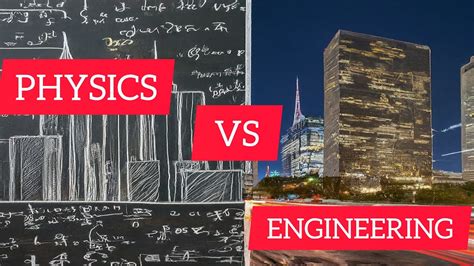Introduction
The fields of physics and engineering are often intertwined, but they are distinct disciplines with their own unique approaches to problem-solving. Physics is the study of the fundamental laws of nature, while engineering is the application of those laws to the design and construction of structures, machines, and systems.

Similarities and Differences
Similarities
- Both physics and engineering rely heavily on mathematics and scientific principles.
- Both disciplines require a strong understanding of the physical world.
- Both physics and engineering are essential for the advancement of technology.
Differences
- Physics is a more theoretical discipline, while engineering is more practical.
- Physicists seek to understand the fundamental laws of nature, while engineers use those laws to solve real-world problems.
- Physicists typically work in research laboratories, while engineers work in a variety of settings, including industry, government, and academia.
Which Discipline is Right for You?
The best way to choose between physics and engineering is to consider your interests and career goals. If you are interested in understanding the fundamental laws of nature, then physics may be a better fit for you. If you are interested in applying those laws to the design and construction of structures, machines, and systems, then engineering may be a better choice.
The Future of Physics and Engineering
The fields of physics and engineering are constantly evolving. New discoveries in physics are leading to new engineering applications, and new engineering applications are driving new discoveries in physics. This symbiotic relationship is essential for the advancement of both disciplines.
The Benefits of Studying Physics and Engineering
There are many benefits to studying physics and engineering, including:
- Increased understanding of the world around you. Physics and engineering can help you to understand the natural world, as well as the man-made world.
- Improved problem-solving skills. Physics and engineering require students to develop strong problem-solving skills. These skills can be applied to a variety of problems, both inside and outside of the classroom.
- Career opportunities. Physics and engineering graduates are in high demand in a variety of industries. Graduates with these degrees can find jobs in research, development, design, and production.
Conclusion
Physics and engineering are two essential disciplines that play a vital role in our world. They are both challenging and rewarding fields, and they can lead to a variety of exciting career opportunities.
Applications of Physics and Engineering
The applications of physics and engineering are endless. Some of the most common applications include:
- Transportation. Physics and engineering are essential for the design and construction of vehicles, such as cars, trains, and airplanes.
- Energy. Physics and engineering are essential for the development of new energy sources, such as solar and wind power.
- Medicine. Physics and engineering are essential for the development of new medical technologies, such as MRI machines and pacemakers.
- Communication. Physics and engineering are essential for the development of new communication technologies, such as the internet and cell phones.
The Future of Physics and Engineering Applications
The future of physics and engineering applications is bright. As we continue to learn more about the fundamental laws of nature, we will be able to develop new technologies that will make our lives easier, healthier, and more connected.
The Importance of Physics and Engineering
Physics and engineering are essential for the advancement of our society. They are the foundation for many of the technologies that we rely on every day. By understanding the fundamental laws of nature, we can harness their power to improve our lives.
Conclusion
Physics and engineering are two of the most important disciplines in the world. They are essential for the advancement of our society and our understanding of the universe. By studying physics and engineering, we can help to create a better future for ourselves and for generations to come.
Table 1: Physics vs Engineering
| Feature | Physics | Engineering |
|---|---|---|
| Focus | Fundamental laws of nature | Application of those laws |
| Work environment | Research laboratories | Industry, government, academia |
| Career opportunities | Research scientist, professor | Design engineer, project manager, consultant |
Table 2: Benefits of Studying Physics and Engineering
| Benefit | Physics | Engineering |
|---|---|---|
| Increased understanding of the world around you | Yes | Yes |
| Improved problem-solving skills | Yes | Yes |
| Career opportunities | Research, development, design, production | Design, construction, operation, maintenance |
Table 3: Applications of Physics and Engineering
| Application | Physics | Engineering |
|---|---|---|
| Transportation | Laws of motion, thermodynamics | Vehicle design, construction, operation |
| Energy | Laws of thermodynamics, electromagnetism | Energy generation, transmission, distribution |
| Medicine | Laws of physics, biology, chemistry | Medical devices, imaging technologies, treatments |
| Communication | Laws of physics, mathematics | Telecommunications, data transmission, networking |
Table 4: The Future of Physics and Engineering Applications
| Application | Future developments | Benefits |
|---|---|---|
| Transportation | Self-driving cars, electric vehicles, hyperloop | Reduced traffic congestion, improved safety, environmental sustainability |
| Energy | Solar panels, wind turbines, nuclear fusion | Reduced greenhouse gas emissions, increased energy independence |
| Medicine | Gene editing, nanotechnology, personalized medicine | Cures for diseases, improved quality of life, extended lifespans |
| Communication | 5G networks, artificial intelligence, quantum computing | Faster and more reliable data transmission, improved connectivity, new applications |
